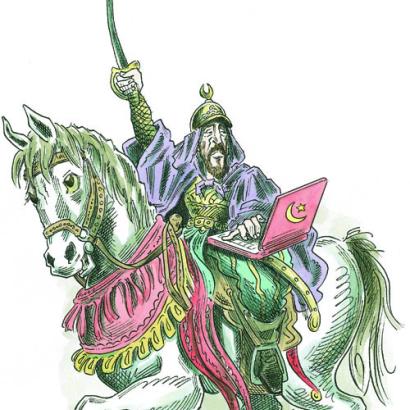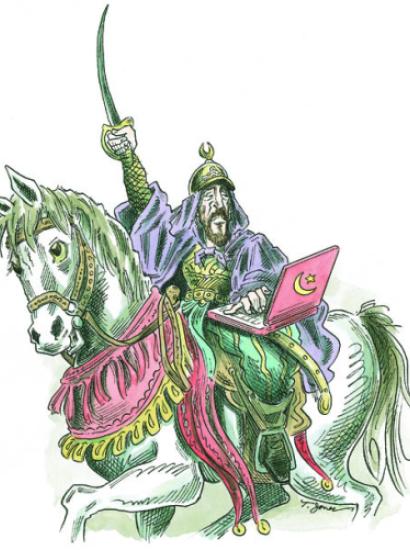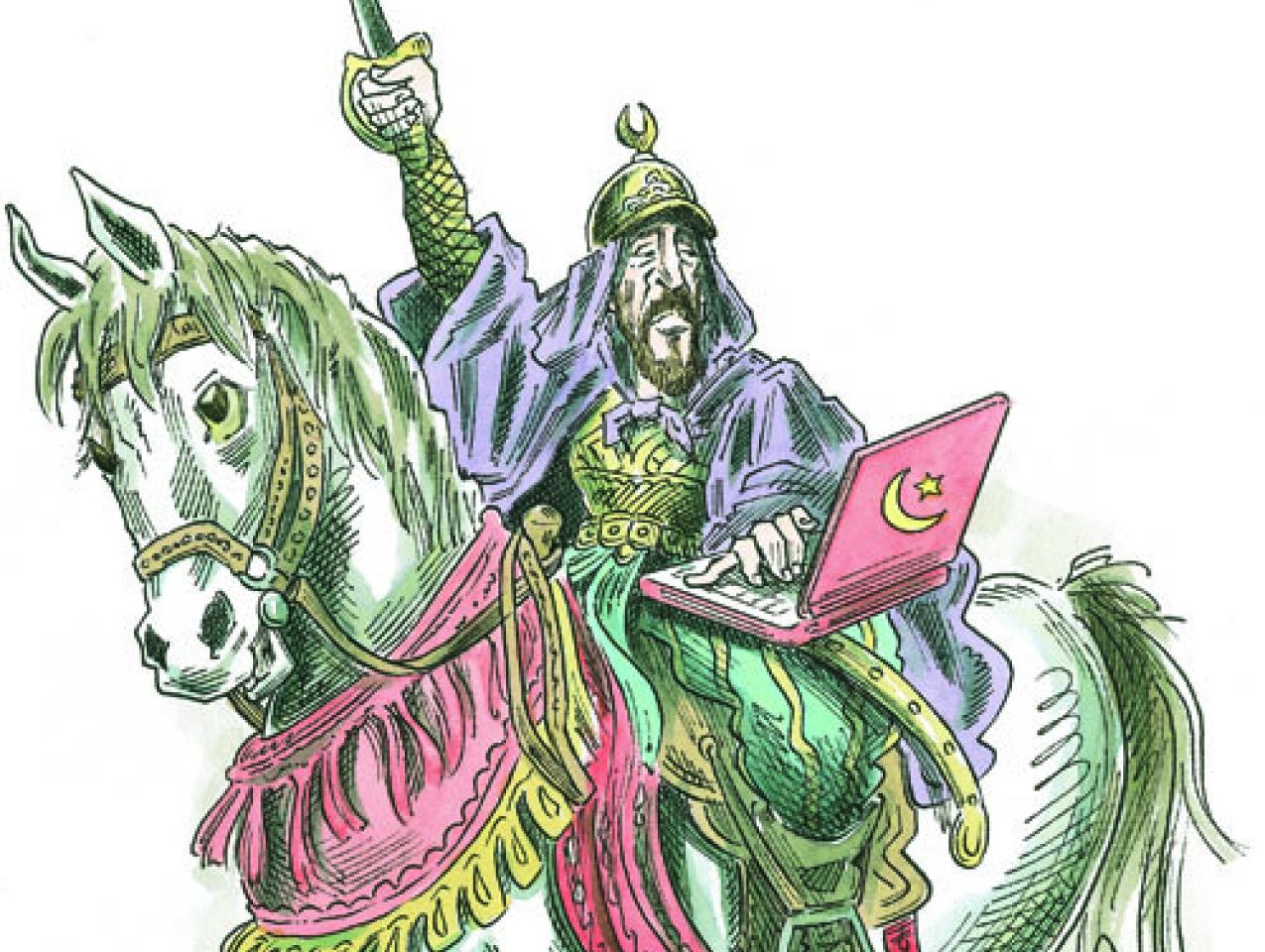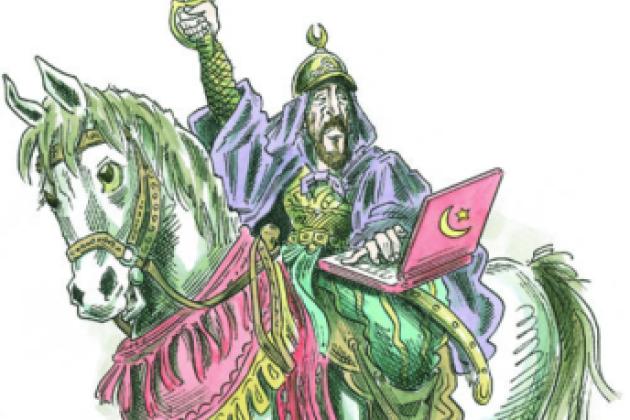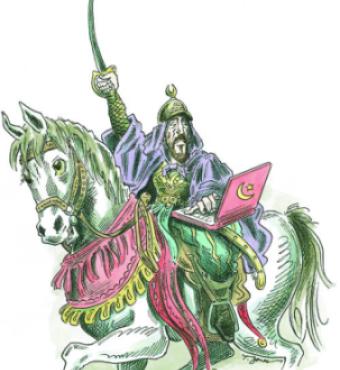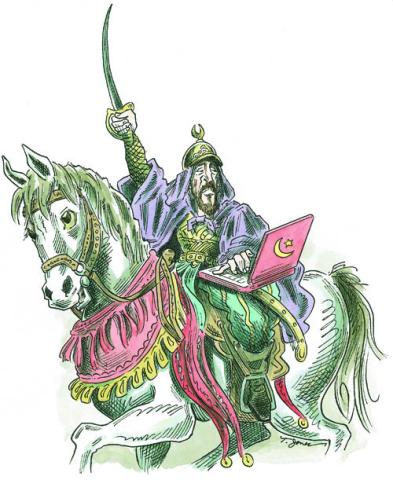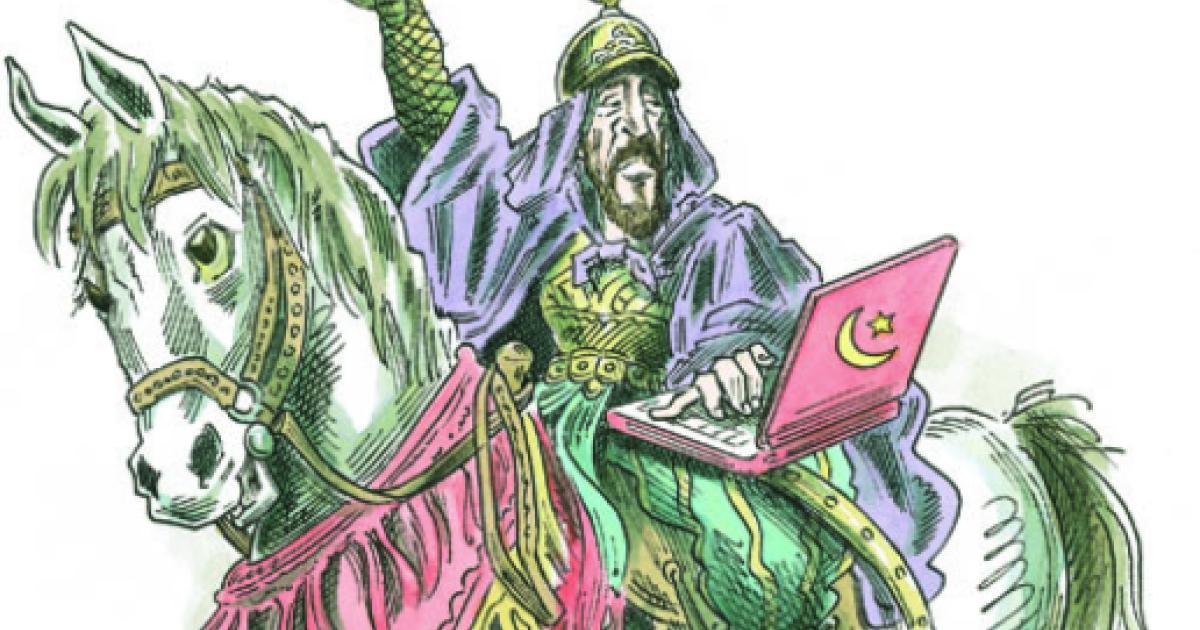- Security & Defense
- US Defense
- International Affairs
- US Foreign Policy
- Terrorism
- History
- Military
- Contemporary
- US
- World
- Law & Policy
- Civil Rights & Race
Peter Robinson: In Tunisia a street vendor named Mohamed Bouazizi protested the harassment he had suffered at the hands of local police by committing suicide, setting himself ablaze. Shortly afterward, the governments of Zine el-Abidine Ben Ali, president of Tunisia for twenty-three years, and of Hosni Mubarak, president of Egypt for some thirty years, had been overthrown. A civil war broke out in Libya; the king of Jordan dismissed his cabinet; and protests took place in Bahrain, Yemen, Iraq, and Iran. How do we understand this?
Victor Davis Hanson: Well, there are two things going on. One is we live in an age of Facebook, Twitter, and the Internet, so something that would be local in Tunisia now resonates all over the world. And in the case of the Middle East, whether it is monarchy, theocracy, or military dictatorship, they all have one common denominator—they deny people freedom, they have ruined the economy, and they have stolen from the people. There has been this seething anger, and in some part the demonstration of democracy in Iraq was the model. What would have been a local prairie fire has turned into a conflagration.
Robinson: Contrast what is taking place in the Arab world in 2011 with the Velvet Revolution, the anti-communist revolution that swept Eastern Europe in 1989.
Peter Berkowitz: For one thing, in the Arab world you have the impact of Islam, which of course we did not have in the European revolutions. And we really do not know what the consequence is going to be. One of the important developments in recent months that you left out is that Hezbollah has taken over the government of Lebanon, ousting pro-Western Prime Minister Saad Hariri and installing what looks to be a Hezbollah puppet who is certainly good friends with the Syrians. This is a tremendous threat to freedom. What you had in Europe was a clear and definite overthrowing of the alternative to Western-style liberal democracy and a clear determination to embrace Western-style liberal democracy. What we see in the Arab Middle East is a definite determination to get rid of authoritarian dictators, partly because people are living in grinding poverty. What we don’t know in this case is what the people want.
Robinson: Let us stay with Egypt for a moment because it is overwhelmingly the largest in population, historically the center of the Arab world, cultural center of the Arab world. The historian Bernard Lewis noted in a recent interview that the Arab world has no history of democracy. Thirteen hundred years of Islam in the Arab world has produced zero democracies except for the 1970s in Lebanon, and the Christian minority played a central role in that brief democracy. All right, Bernard Lewis: “In Egypt, the religious parties have an immediate advantage. First, they have a network of communication through the preacher and the mosque which no other political tendency can hope to equal. Second, they use familiar language; the language of Western democracies is for the most part newly translated and not intelligible to the great masses. In genuinely fair and free elections, the Muslim parties are likely to win, and I think that would be a disaster.” What is going to happen in Egypt?
Hanson: I do not think we know, but we have a lot of paradoxes that are going on in the region. One is that these odious dictators like Mubarak tend to be more liberal in classical terms than the population. So if we were to have a plebiscite, the people might reflect a level of religious intolerance, anti-Semitism, anti-Americanism, and oppression against women that would not be true of the Mubarak government, despite its horrific human rights record. Another paradox we have in the region is that, unlike Eastern Europe, where they were rebelling against monolithic communism, here we have a potpourri of Iranian theocracy, Libya’s crazy authoritarianism, Mubarak’s pro-American military dictatorship, the Baath Party in Syria.
TWITTER TO FREEDOM
Robinson: One of the principal figures in the Egyptian revolution was a young Egyptian Google executive. Protesters throughout the Arab world have been in touch on Twitter, they are keeping in touch by e-mail, they are posting events on YouTube. Is what has taken place conceivable without high tech? Is the political revolution we are witnessing now conceivable absent the high-tech revolution of the past decade and a half or so, the communications revolution?
Hanson: I do not think so, but I think we are seeing the veneer of the revolution. I think that the radical Islamists know about social networking and electronic information and so does the Westernized upper and smaller middle class. They galvanize people. But to the degree that somebody who is a peasant farmer in a village on the Nile is getting up every morning and looking at Twitter, I am dubious that that is happening. So what I am suggesting is that they cause the initial revolt. They got rid of Mubarak and now the social networking may or may not be effective. What is going to capture the majority are the mosques and state-run television, people getting a little bit more mundane messages who do not participate. Everybody in Washington and New York and at Harvard and Yale, they do Twitter and Facebook, but people out in Fresno or working in a factory are not tweeting every day.
Berkowitz: The rise of the Internet, e-mail, and social networking is very much a double-edged sword. In this country the great beneficiary in the 2008 election was Obama, whose campaign expertly used social networking. In the past two years the real beneficiary of the new technology has been the tea party movement. This is neutral, it is a double-edged sword, and just as Victor says, the Muslim Brotherhood, the forces of radical Islam, they not only know how to use them, they are using them very effectively even as we speak.
Hanson: Just an accelerator, a catalyst . . . so all these movements might have happened, but they are happening at lightning speed now.
Robinson: We know that one of the aims of at least some branches of the radical Islamic movement is a restoration of the caliphate. They are talking about something like what you can glimpse most recently in 1918, before the fall of the Ottoman Empire. And what you see when you look at a map is all kinds of places that we now think of as nations simply did not exist. Iraq was not there; Lebanon was not there; Israel was not there; Egypt was not. It was an undistinguished region. All right, so the question is: does the new communications technology tend to play into this dream of a restoration of somehow transcending or eliminating the nation-state, which is an artifact of the twentieth century, and play into the dream of a pan-Arab movement?
Berkowitz: For sure. Just as Western progressive liberal internationalists are delighted by the rise of the Internet because they think it helps lay the foundations for a one-state world and global governance. There is some reason for that.
Robinson: It does tend to act as a solvent of the nation-state.
Berkowitz: By the way, just as Marx said in The Communist Manifesto that the rise of the telegraph helped lay the foundations for universal revolution of the proletariat, so too the radical Islamists certainly use this technology in the hope that it is laying a foundation.
By the way, with the caliphate we can be even more precise. The caliphate means a single government under Islam, under all territories that have previously been held by Islam. In other words, stretching from Spain in the west to somewhere beyond Iran in the east. One government, and it is a Muslim government. That is what the Muslim Brotherhood in Egypt is committed to.
Robinson: The New York Times in February: “Officials responded with a mass show of force across China. After anonymous calls for protesters to stage a Chinese Jasmine Revolution went out over social media and microblogging outlets, the words Jasmine Revolution, borrowed from the successful Tunisian revolt, were blocked on sites similar to Twitter and Internet search engines. In recent days, more than a dozen lawyers and rights activists have been rounded up and more than eighty dissidents have reportedly been placed under varying forms of house arrest.” Why do all three of us know that the Chinese won’t let it happen?
Hanson: Because they are willing to use a level of coercion that essentially says to the West: “We do not really care what you say, you have no influence over us, and if I could be blunt, you are borrowing a trillion dollars for health care when 400 million of us have never seen a Western doctor. So do not give us any lectures because you have no influence over us.” I would say, though, on your interest about the caliphate, I do not see a monolithic Muslim nation appearing because it is no more monolithic than the European Union, and the EU is shattering as we speak. The idea that Canada and the United States and Britain are going to have an Anglosphere again is ridiculous. There are so many fissures within the Arab world: Shiite, Sunni, Alawite, tribal, geographical, economic systems. And remember, for all of the PC anti-Americanism, Saddam Hussein and Khomeini—and throw in Hafez Assad and Libya—have killed more of their own people than we did in Iraq in the first Gulf War trying to liberate them.
Berkowitz: If I may say so, I think that Victor is right; the likelihood of a caliphate emerging is extremely remote. However, it is a real aspiration for lots of people and lots of leaders, and it is reasonable to worry that there will be a great deal of death and destruction as these people unsuccessfully seek to bring about a caliphate.
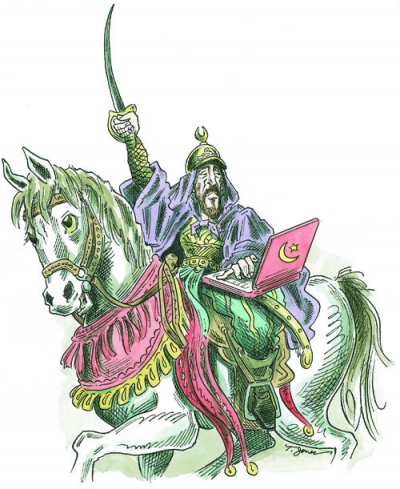
ISRAEL
Robinson: What is the thinking in Israel about the meaning of this Arab revolution for Israel?
Berkowitz: Needless to say, the Israelis are very concerned. The wisest among the Israelis made clear that when people cry out for freedom and democracy, Israel should stand with them. But they also made clear, concerning the people in Egypt, that’s a long-term aspiration, and the path to freedom and democracy might be very bumpy for the Egyptians and very dangerous for the Israelis. In terms of actual threats, the Israelis don’t fear conventional warfare.
Robinson: Tanks are not going to roll across the Sinai.
Berkowitz: They are not going to roll across the Sinai; it is a long way across the desert and those tanks are extremely vulnerable to the Israeli air force. So that is not a short-term or intermediate-term threat. What is the near-term threat is even worse security in the Sinai Peninsula than the security provided by Hosni Mubarak’s regime. There are now missiles in the Hamas-controlled Gaza Strip, and they are real missiles, not crummy rockets, which can reach Tel Aviv and kill hundreds of thousands of people. Every single armament in the Gaza Strip got there from Iran through the Sinai Peninsula, smuggled in, illegally with the help of Bedouins, maybe Egyptian forces were bribed. If this security breaks down even more, this is a tremendously significant threat to Israel. Moreover, it is not just Gaza; Israel shares a long border on the Sinai Peninsula. There is no force there, no security barrier there. There is a very serious threat of greater infiltration through the Sinai Peninsula into Israel; it is very worrisome from the Israeli point of view.
Robinson: Over the last decade roughly—correct my timing—as best I can tell there have been two big trends in Israel. One is tremendous economic buoyancy. That is a happening place: lots of high technology, levels of education, the sense of simply leading a good life is everywhere to be seen. Trend two—things have gotten more and more dangerous. Iran in pursuit of nuclear weapons under a leader who has spoken openly about driving Israel into the sea; the Turkish government becoming more Islamic and supporting that fleet of civilian ships that attempted to break the Gaza blockade; the victory of Hezbollah in Lebanon; unrest and uncertainty in Egypt. The two Arab countries that have made peace—Egypt, government overturned; Jordan, king under pressure. Just looking at it objectively, doesn’t one have the sense that the existential moment is approaching? How does Israel cope with that?
Berkowitz: I wish I could tell you how they cope with that, where they find the fortitude. Of course there is a kind of schizophrenia in Israel. And your description is absolutely right. Extraordinary prosperity: the greater Tel Aviv area has become one of the great Mediterranean beach towns. At the same time, you hear a term among national-security people and ordinary citizens that I did not hear before, and that is, I am speaking about Iran, a threat to our very existence, an existential threat. All the previous wars, with the exception of the war of independence, were fought outside Israel, very close to Israel, but urban areas were not targeted. What is going to be different, and it already began to be different with the 2006 second Lebanon war, is that all the enemies you mentioned have intermediate-range missiles that will reach Tel Aviv. They will do terrible damage.
THE UNITED STATES AND THE ARAB MOMENT
Robinson: Historian Niall Ferguson on the Egyptian situation as it was unfolding: “President Obama faced stark alternatives. He could lend his support to the youthful revolutionaries or he could do nothing and let the forces of reaction prevail. He did both, some days exhorting Egyptian President Hosni Mubarak to leave, other days drawing back and recommending an orderly transition. The result has been a foreign policy debacle. The president has alienated everybody, not only Mubarak’s cronies in the military, but also the youthful crowds in the streets of Cairo, and America’s two closest friends in the region, Israel and Saudi Arabia, are both disgusted.” He is going over the top a little, don’t you think?
Hanson: No, I don’t. I agree with him, because he carefully—as a lot of us did—collated what Joe Biden, Barack Obama, and Hillary Clinton said over an eighteen-day period . . . how they addressed the Egyptian situation and the relative silence about Libya. And he’s also collating what happened in Iran in 2009 (the sermon about meddling in internal affairs), the silence about Syria, and then some gratuitous remarks about Tunisia. And you put it all together and one wants to know: is the United States pressuring governments that are autocratic? Kind of, sort of, but not until they think that the demonstration is going to succeed. Do they have a principle of support for human rights, democracy, constitutionality, legality, an independent judiciary? Can’t see it. We don’t have any broad principles that we apply to everybody. So what is the policy now? The policy is this: if there is a monarchy, a theocracy, a military dictatorship, or a brutal, savage Baathist, or whatever they are, and their people revolt against them, we [hold our finger up in the wind] and we wait, and we try to see what are the chances that the people in the street are going to prevail. And at some critical mass when they prevail, then we are going to go back and support them and then retroactively we are going to say we always did say that we supported you. And if they look like they are going to fail or they are quiet, then we back off and say we want to transition it quietly.
Then there is one other policy, and this is why Niall Ferguson is so upset. If you say that you cannot meddle in Iranian affairs and if you say that this horrific regime in Syria we have to reach out to as we did not in the Bush administration, and if you do not say anything about utter savagery in the streets of Libya, but you do say that you think that Mubarak and the Tunisians and the Jordanians have to reform, then what you are essentially saying, whether you meant to or not, is to the degree that you do not like the United States, you butcher lots of people, and you keep the press from watching it, we are indifferent; perhaps we are even supportive. To the degree that you like us, you bring in the cameras, and you are pretty soft about the way you put down unrest, then we’re going to be very angry at you. And it makes no sense. So they need to go back and reset the “reset diplomacy” and have a principled position that is not contingent on individual countries or personalities but is more abstract.
Robinson: You’re secretary of state—what should the American policy be?
Berkowitz: The American policy in my judgment should have been rooted in the great tradition that began with Harry Truman in 1947, in the wake of communist conquests in Eastern Europe. He said that it will be the policy of the United States government to promote the conditions of freedom everywhere around the world; a policy that was reaffirmed by Ronald Reagan in his great Westminster speech, in which he outlined the conditions under which freedom flourished, which had to do with a strong civil society and freedom of press, and an independent judiciary. It was then reaffirmed by George W. Bush in 2003 at his great NED speech when he announced the freedom agenda and became the first president to say that now the freedom agenda must focus on the Arab/Muslim world. That should have been our policy, but the Obama administration has systematically distanced itself from the freedom agenda.
Robinson: Worth noting that the first president you named was Harry Truman, a Democrat. This can be a bipartisan policy.
Berkowitz: You have an excellent point; it has bipartisan roots.
Robinson: Last question, a hard one I think. Two quotations. First, political scientist Paul Rahe: “I believe we are witnessing a strategic shift in the Mediterranean. The younger generation of Arabs is turning to the only cultural force that has purchase in the post–Cold War world; they are turning to Islam. Tunisia, Egypt, Libya, Jordan, Bahrain will become more hostile to us, to our European allies, and of course to Israel.” Quotation two, Natan Sharansky: “The democracy that hates you is better than the dictator who loves you.” Who is right?
Hanson: Well, it is a little bit more complex because we have two theocratic regimes that give everybody as much Islam as they can handle. One of them is the Sunni version in Saudi Arabia, and one is the Shiite version in Iran, and neither one of them is popular. And there are people protesting both because they are authoritarian and corrupt and they do not see life as so good under the Quran. So, what we are trying to figure out is how do you warn people who are throwing out military dictatorships and secular strongmen and say to them, this is the path to consensuality, because if you really want the Muslim Brotherhood and you want theocracy, you have two good examples—Saudi Arabia and Iran—and the people there are not happy. So I think that this is the Arabs’ moment.
I just would finish by saying for fifty years we have been told by the Arab street and its intellectuals, especially in Europe, that “they brought the Baathists to us, they put Nazis into us, they brought the Soviet-style paradigm, they brought the corrupt American dictatorship. All these -isms and -ologies were forced on us and we did not have any choice.” You go to Libya and somebody will tell you, “You put Gadhafi on”; somebody will tell you, “You put Khomeini on.”
Robinson: That persistent sense of victimhood.
Hanson: Exactly. Now everybody realizes this is the Arabs’ moment. This is grass roots; the world is watching. You guys don’t have to put theocracy, monarchy . . . it is yours. And we will see what the aspirations of the Arab people are. Because everybody is staying out of it, and it is up to them to make a government that reflects what the people want, and we will see what the people want.
Berkowitz: Neither Sharansky nor Rahe is right, but there is a kernel of truth in each. You need to put them together. There are two forces that have purchase on people’s souls in the contemporary Middle East. One force, as Paul Rahe says, is Islam. But the other force is a real force, it also has purchase on people’s souls, it is what Natan Sharansky writes about: the spirit of democracy, the desire to be free, the desire to live under laws that you yourself have a hand in making, to call the shots for yourself. The question is which of these two is going to be the victor. We don’t know which is going to be the victor; therefore, we should pursue things in the spirit of Truman, Reagan, and Bush, and what we should work on is not in the first place getting elections up and running, whose results can be not just uncertain but quite hostile to our interests and to international interests. What we should work on is promoting with care, caution, and judiciousness the conditions under which freedom flourishes. That means helping people who want freedom to build independent judiciaries, expand the freedoms of the press, create economic opportunity, and certainly not least, improve the opportunities for girls to be educated and for the protection of women’s rights. That’s what we can do to make things better.








